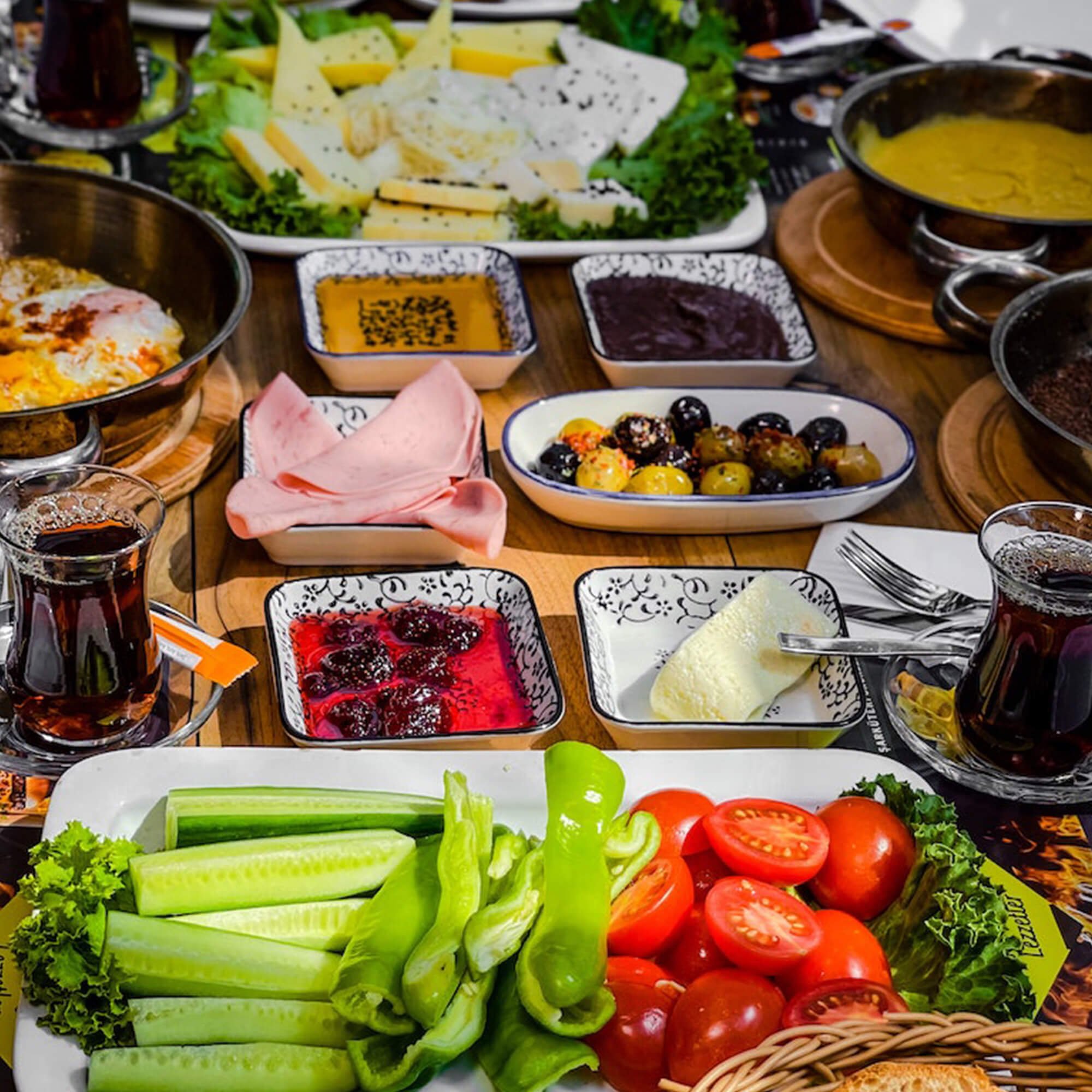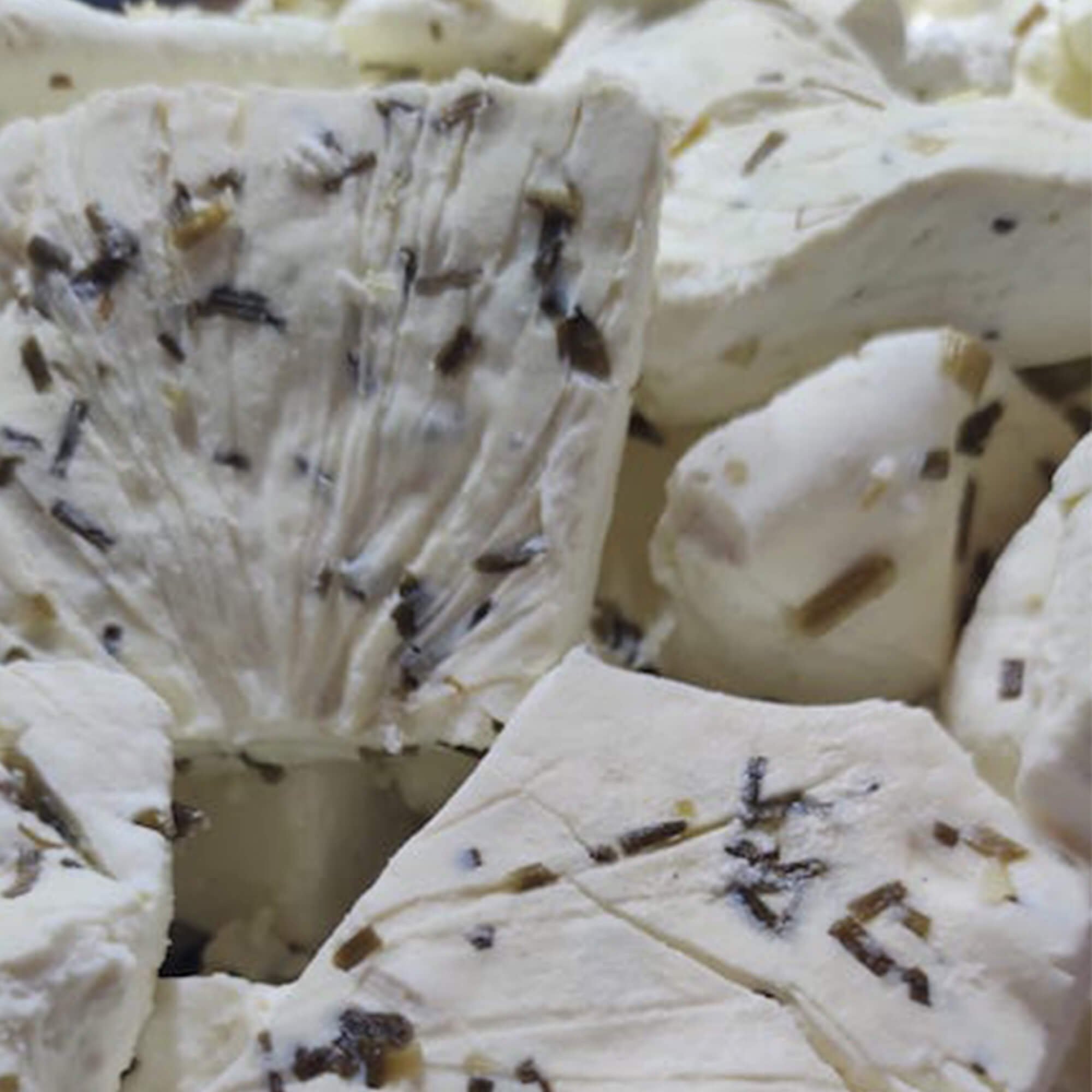Discover Why Cheese Makes Turkish Breakfasts So Great
Breakfast in Turkey is the most important meal. Unlike many morning meals in the United States, it is not a grab and go event. It is a cultural ritual where the whole family gathers to begin the day together. And cheese plays a starring role.
Turkish breakfast photo credit Rosie Cohan
In Van, a city in Eastern Turkey, I sat cross-legged on a square, woven, hand-embroidered rug surrounded by my adopted Kurdish “family,” Reyhan, the mother, served breakfast to the ten chatty family members who range in age from one to eighty. They alternate between speaking Turkish and Kurdish and begin to dig into the feast that is breakfast. Black and green olives, candy sweet tomatoes and crisp cut cucumbers from their garden brightened the shiny white communal plates. Two puffy loaves of soft, fresh, white bread with crispy crusts had just been brought from the bakery. One daughter emerged from the house with boiled eggs collected from the chickens walking around clucking. Another served the lifeblood of Turkey, steaming brick colored tea poured into small, tulip-shaped glasses. These are basic ingredients of a Turkish breakfast. But the centerpiece of any Turkish breakfast is the regional cheeses that adorn the table.
Van: Breakfast Capital
Many people have called Van the world capital of breakfasts, as they are often composed of over 20 items. They even have a street called Kahvalticilar Carsisi, the Breakfast Street, where breakfast salons serve the elaborate spread of dishes all day. Being an ancient dairy area on the Silk Road, Van’s local cheeses, yogurt and hand churned butters are on the breakfast table. In fact, the Van breakfast is so famous it is now offered in breakfast salons in Istanbul and other large cities.
Van’s Mountain Cheese
Van Otlu Peynir photo credit Yusuf Bor
The unique cheese to this area for breakfast is a mountain cheese Van Otlu Peyniri. It’s similar to feta but softer, saltier and deeper and made by villagers in the nearby mountains who raise the sheep whose milk is used to create the cheese. Preserved in brine and infused and or covered with herbs gathered from the nearby mountains, it is usually buried underground for four to six months. The most prevalent herb used is a wild garlic called sirmo, but also common is the use of mountain wild thyme, fennel, mint and various wildflowers often picked by mountain village children as a summer activity.
I smeared the Peynir on the soft, fresh bread and slowly bit into it. The pungent smell and tangy taste took me by surprise, but the creamy texture tickled my tongue, and the wild mint, thyme and garlic brightened the earthy taste. No wonder it is in demand throughout Turkey for breakfast
Typical Breakfast Cheeses
In addition to the Van mountain cheese, there are over 190 varieties of Turkish cow, sheep and goat milk cheeses. The cheese varies by region, but you will almost always will find some version of Beyaz Peynir (White Cheese) at breakfast tables throughout Turkey. The milk is clotted with vegetable rennet. The curds are, cut, salted and pressed into blocks to be aged in brine for approximately six months. Try several different kinds in any Turkish cheese shop or an open local market. One of the most famous is Ezine, made in the Canakkale region in Aegean Turkey.
Ezine Beyaz Peyner photo credit Murat Yavuz
A crumbly, white cheese with a mild flavor is Lor Cheese. It is made not from curds but from whey. It is often used in pastries and baked in breakfast boreks, a flakey pastry or noodles layered with cheese and baked. I like it melted on gozleme, a crepe-like dough flattened with a thin rolling pin on a round wooden board and then cooked over an open fire. Lor can be eaten plain, but often is paired with local homemade fruit jams or local honey. Smear it on fresh bread or a simit, the Turkish version of a sesame bagel.
Kasar photo credit Murat Yavuz
Kasseri or Kasar (pronounced Kashar) is a light yellow, hard, rind cheese that is ubiquitous throughout Turkey. It is made of sheep milk and contains a small amount of goat’s milk. Vegetable rennet is added. Curds are soaked in salt water to create a dough-like consistency that fits into molds or is patted into soft rounds. It is drained and aged for about three months. It is in the same family as provolone cheese and has a mild taste. The most famous Kasar cheeses come from the Kars area near the Armenian border.
Tulum Photo credit Murat Yavuz
There are different varieties of Tulum cheese depending on where you are and on climate conditions. Most are made of goat milk. A full fat cheese, it is made from small pieces of curds cut with special knives and wrapped in cheese cloth to drain for eight hours. The pieces are poured into a salted goat skin, covered again with salt and aged for three to six months in a cool cave or cellar. Aegean is kept in salt water from the sea during the aging process. It has a stronger, saltier taste than Black Sea Tulum, which is not kept in salt water. Additional regional differences depend on what fresh local herbs are prevalent.
Otlu & Örgü Cheeses photo credit Murat Yavuz
Turkish string cheese (Dil Peynerli) is almost always part of the Turkish breakfast. Primarily produced around Bursa and Bilicek Province, it is a fresh, white, and slightly salty cheese. Sold in logs or sometimes braided (Orgu Peynerli) is pulled apart into strings. Often paired with melon and other sweet fruits, it is found on most breakfast tables.
Finding Turkish Cheeses
I asked a cheese monger at a busy outdoor market in Istanbul why I don’t see Turkish cheeses in America. He explained that the best cheeses are locally made and are not mass produced. It is very expensive to widely send them outside of the country. Mass produced Turkish cheeses are available online, but they do not have the same wonderful taste of locally, produced artisan cheeses. Tasting the various cheeses and experiencing a traditional Turkish breakfast is a great reason to visit Turkiye.
A friend told me a Turkish saying, “cheese and bread is a banquet”. So, even if you can’t get to Turkiye, be like the Turks. Gather friends and family to start the day and make breakfast a banquet with some fresh bread and some of your favorite cheeses. “Afiyet Olson”, Enjoy Your Meal!






